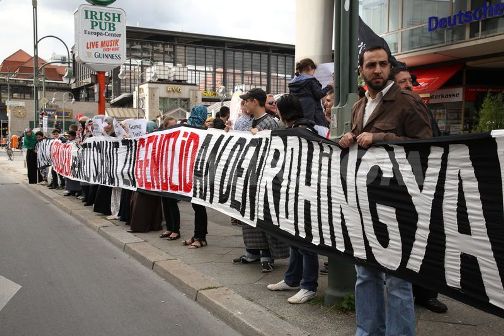Three South African based advocacy groups say they are appalled by the global silence on the human rights violations against Muslim populations and other religious minorities in both Burma and Sri Lanka. In a joint statement on Friday, the Protect the Rohingya, Media Review Network, and Palestine Solidarity Alliance organisations said the Rohingya minority were subjected to “blatant rhetorical hate speech, incitement to violence and physical attacks”.
“In both countries the violence against minorities has spanned at least 20 years and the states have turned a blind eye despite the fact that the propaganda and hate speech threatening a Muslim take over has no basis in reality as the Muslims are a minority population in both countries,” read the joint statement.
“Buddhist extremism has been allowed free reign to incite violence, disseminate anti-Muslim propaganda and make threatening calls for brutality to be unleashed on minority Muslim and Christian populations in both Burma and Sri Lanka. Freedom of religion or belief is a human right, irrespective of State approval and respect for such rights does not depend on state administrative procedures.”
The groups noted the “flagrant hate speech” by extremist monks like U Wirathu of the 969 in Burma and Gnansara of the Bodu Bala Sena (BBS) in Sri Lanka. It said it had become apparent that the universal human rights which call for the protection of minorities and freedom of religion are being implemented selectively.
Gnanasara mobilised his followers at a rally to unite and take things into their own hands. Justice Minister and Sri Lanka Muslim Congress (SLMC) leader Rauf Hakeem was reported to have said that the current regime was at fault for allowing the bloodshed to escalate. At least four people were killed and nearly 80 seriously wounded and homes, businesses and vehicles were torched.
Sri Lankan Muslims are Tamil speaking and there are claims by Tamil nationalists that they belong to the larger Tamil nation. This has caused much repression by the Buddhist – Sinhalese majority. Sri Lanka is home to 21 million muslims approximately 10% of the population. Previously in October of 1990, close to 75,000 Muslims were forced out of their homes in the Northern provinces. The recent violence brings the total number of displaced to 250 000 with no resettlement plan.
The SLMC has demanded a UN probe into one of the country’s worst-ever religious riots, as President Rajapakse toured the violence-hit region last week. The SLMC also planned a boycott of parliament as a protest against Colombo’s failure to rein in the BBS widely accused of sparking theses clashes. The Asian director of Human Rights Watch said that the Sri Lankan authorities need to do more than arrest those carrying out the anti-Muslim violence.
“They need to investigate and identify any instigators. This means taking a hard look at the role and relationship between extremist Buddhist groups like the BBS and the Sri Lankan security forces.”
According to the Office of the High Commissioner for Human Rights, Sri Lanka’s government has promised to amend and enhance existing laws with regard to hate speech, but has not yet acted on the promise. The Commissioner urged Sri Lanka’s government to “urgently do everything it can to arrest this violence, curb the incitement and hate speech which is driving it and protect all religious minorities. She added that she was very concerned that this violence could spread to Muslim communities in other parts of the country.
“The open declaration of violence on minority communities likewise is also unacceptable and unpalatable to the human conscience. Nation states shall be obliged in accordance with the principles of international law and universal jurisdiction to bring these perpetrators to justice,” said the organisations.
Attorney Ziyaad Patel, legal representative of the three bodies stated that some of the foregoing conduct alleged in Sri Lanka / Burma and the atrocities committed in Burma against the Rohingya have manifested itself as crimes defined above in contravention of international criminal law. Patel further added that governments permitting such persecution are apposite to the States responsibility in the creation of a constitutional legal framework aimed at protecting and promoting fundamental basic human rights.
“We urge the South African government, the international community and peace loving people everywhere to speak out firmly for justice, to demand equal rights and the protection of minority communities in Burma and Sri Lanka,” he said.
“Furthermore, we demand that the South African Government who understands the oppression of the apartheid legacy, classified under international law as a crime against humanity to utilize appropriate political and trade instruments to initiate behavioral change of these regimes that permit such violence and incitement to violence under its watch and to take such measures necessary that shall include but not limited to trade sanctions boycotts and divestment.”






 WhatsApp us
WhatsApp us 

